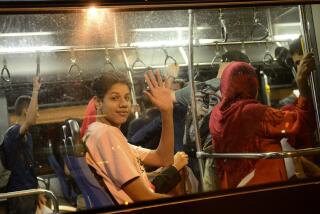Fighting in Sunni Triangle Dims Prospects for Talks
BAGHDAD â Renewed fighting and U.S. airstrikes in western Iraq dimmed hopes Tuesday that negotiations would peacefully resolve the months-long standoff with insurgents in the region.
After a four-day lull, U.S. warplanes resumed their bombing campaign against militant targets in Fallouja, destroying a well-known restaurant and a house that military officials believed was being used as a hide-out by followers of Jordanian militant Abu Musab Zarqawi.
The midnight strike against the Haji Hussein restaurant in Fallouja -- known across Iraq for its kebabs -- killed two night-shift guards, witnesses said, and destroyed several nearby stores.
âWe have nothing to do with the Zarqawi group as the Americans allege,â owner Mohammed Hussein said. âSeveral families depend on this restaurant for their livelihood.â
Tuesday afternoon, a gun battle between U.S. troops and insurgents on the eastern edge of the city forced several residents to flee their homes.
Witnesses said U.S. troops and tanks were inside the city limits. First Lt. Lyle Gilbert, a military spokesman, called the report âbaseless.â
Gilbert said insurgents began firing mortars at a group of Marines outside town, and the Marines called in air power to back them.
The strikes occurred as U.S. and interim Iraqi government officials negotiated with Fallouja tribal leaders and clerics in the hope of finding a peaceful resolution similar to the deal struck last week in Sadr City, a Shiite Muslim slum in Baghdad where militants had been battling U.S. troops. Previous negotiating efforts in Fallouja have failed.
Sheik Khalid Hamoud, a negotiator in Fallouja, said Tuesday that talks were continuing and he was hopeful that an agreement would be announced shortly.
U.S. and Iraqi military leaders have vowed to crush the remaining insurgent strongholds before the countryâs first election in January. Joint U.S.-Iraqi forces have launched offensives in Samarra and northern Babil province. The peace agreement in Sadr City, if it holds, will eliminate another hot spot.
Fallouja and Ramadi -- neighboring cities in Iraqâs so-called Sunni Triangle region -- are widely seen as next on the list of targets.
Bush administration officials recently have backed off their tough talk, saying they would rather postpone major offensives until after the U.S. election on Nov. 2.
This week, interim Iraqi Prime Minister Iyad Allawi suggested that he might move against insurgent strongholds on his own. âWe dictate our own actions,â he said.
Tensions rose in Ramadi on Tuesday as U.S. and Iraqi forces raided seven mosques, arresting four suspected insurgents and confiscating what U.S. officials called bomb-making materials. Among those detained was a local imam and his son, witnesses said.
Coming on the heels of an airstrike Monday on a mosque in Hit, the raids were part of a high-stakes U.S. strategy to root out militants who use religious buildings as sanctuaries.
U.S. officials previously were reluctant to attack mosques for fear of alienating devout Muslims. In the Shiite holy city of Najaf, for example, troops were often ordered to stay 100 yards from the gold-domed Imam Ali shrine, even though militants fired mortar rounds at them from the mosque compound.
âThese raids sent a clear message to the insurgents that they can no longer use mosques as safe havens,â said Brig. Gen. Joseph F. Dunford, assistant commander of the 1st Marine Division. He said American troops remained outside the mosques while Iraqi forces led the raids.
U.S. officials report that insurgentsâ use of mosques as hiding places is growing. Before the Sharqi Mosque in Hit was bombed, militants inside attacked American soldiers with small arms and machine guns, U.S. officials said.
The U.S. strikes on mosques are a âterrorist and barbaric act,â said Sheik Nawaf Jaber, imam of Abd ibn Qumama. âAmericans donât care for the feelings of Muslims. They claim there are insurgents inside the mosques, but these are lies designed to give Islam and Muslims a bad image.â
Elsewhere in Iraq, an American photographer and 10 Turkish hostages were released in separate incidents.
Paul Taggart, 24, of the New York-based World Picture News agency, had been kidnapped Sunday near Sadr City.
An aide to Shiite cleric Muqtada Sadr said Taggart was abducted by a Shiite group that believed he was a spy, Associated Press reported. He said Sadr pressured the group to free the photographer.
The Vinsan construction firm of Ankara, Turkey, said the truck drivers were freed Monday night. The company, which had temporarily suspended its activities in Iraq, said it planned to resume operations because it suspected that the kidnappers were motivated by money, not terrorism or political gain, according to Associated Press.
In Najaf, Iraqâs leading cleric, Grand Ayatollah Ali Sistani, issued a religious edict requiring Muslims to participate in the voter registration process. His statement is expected to boost support for an election in January, which some groups have threatened to boycott.
Special correspondents in Fallouja and Najaf contributed to this report.
More to Read
Sign up for Essential California
The most important California stories and recommendations in your inbox every morning.
You may occasionally receive promotional content from the Los Angeles Times.










